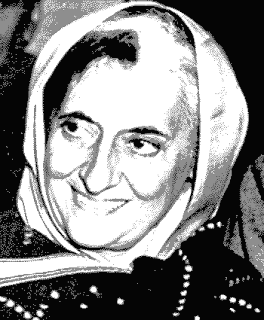
Indira Nehru Gandhi was born on November 19, 1917 and would be the only child of Jawaharlal and Kamala Nehru. Being influenced and inspired by her parents, Indira Gandhi rose to power in India and eventually became prime minister. She dedicated her life to progress in her country despite the overwhelming problems and challenges she encountered.
Her road to power and politics started when she turned twelve years of age. During the time of British imperialism, many Indian National Congress workers from Allahabad did not know when or if the British would arrest them or search their homes. In order to find out when this would occur, the Monkey Brigade was formed. Although Indira claimed to have thought of the idea, some asserted that the Monkey Brigade was the idea of the Congress. In any event, Indira became the leader of this children's group whose purpose was to help end British control in India. Being its leader, she delivered speeches while other children actually warned the people who were going to be arrested. The Congress figured that the British would not suspect children of participating in such involvement. Although some deemed it a joke, Indira took her job very seriously. One of the most significant actions of the Monkey Brigade involved Indira. The Congress party's top officials were organizing a civil disobedience movement. After the meeting, the documents containing the plans of the movement were placed in the trunk of a car with Indira in the back seat. Before the car was ready to leave the area, a police inspector stopped the car in order to search it. However, Indira pleaded with him not to inspect the car because the delay would cause her to arrive late at school. Fortunately, the inspector believed her and the car was not searched.
In 1938, Indira finally joined the Indian National Congress Party, something she always longed to do. Soon afterwards in 1942, she married journalist Feroze Gandhi to whom she eventually bore two sons. Soon after the couple was married, they were sent to prison on charges of subversion by the British. Her first and only imprisonment lasted from September 11, 1942 until May 13, 1943 at the Naini Central Jail in Allahabad.
Fortunately, India won its independence from Britain in 1947. In that same year, Indira's father Jawaharlal Nehru became prime minister and served until his death in 1964. Since her mother had died in 1936, Indira acted as hostess and confidante and traveled with Nehru to meet famous political figures. Later in 1959, Gandhi became the fourth woman elected president of the Indian National Congress. After her father's death, the new Prime Minister Lal Bahadur Shastri appointed Indira Gandhi as minister of information and broadcasting. This position was the fourth highest ranking position in the Cabinet. Many Indians were illiterate. Therefore, radio and television played a major part in informing them. As minister, she most importantly encouraged the making of inexpensive radios and started a family planning program.
After Shastri's death in 1966, Indira Gandhi served as prime minister until India held the next election. She won that election, and in 1967, became one of the first women ever elected to lead a democracy. In 1971, Gandhi was re-elected by campaigning with the slogan "Abolish Poverty." However in 1975, Gandhi was found guilty of violating election laws. Later, the conviction was overturned by the Supreme Court of India. Also, to control population growth, Gandhi implemented a voluntary sterilization program. As a result, adversaries criticized her and her administration in general. To secure her power and because of escalating riots, on June 26, 1975, Indira Gandhi declared a state of emergency which limited the personal freedom of Indians. Also, she ordered the arrests of the main opposition leaders. In her opinion, her dictatorship was for the good of India. But she allowed free elections in 1977, and the Indian people voted her out of office.
She regained her position as prime minister in 1980. Unfortunately on October 31, 1984, Indira Gandhi's Sikh bodyguards assassinated her. They did so to avenge the storming of the Golden Temple in Amritsar. Gandhi had ordered the storming in June because of what her government considered terrorist activity of extremist Sikhs who had occupied the Temple.
As prime minister, Gandhi tried to improve the lives of Indians. With her neighbors, the Soviet Union and China, she improved relations. She also promoted science and technology. In 1971, India sent its first satellite into space. Economically, Indira Gandhi led India to become one of the fastest growing economies in the world toward the end of her time as prime minister.
No comments:
Post a Comment